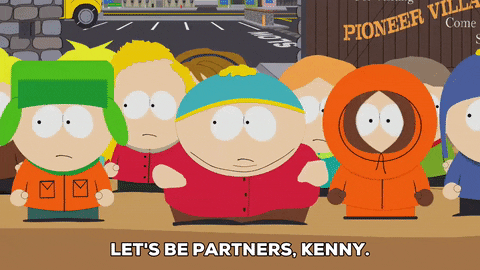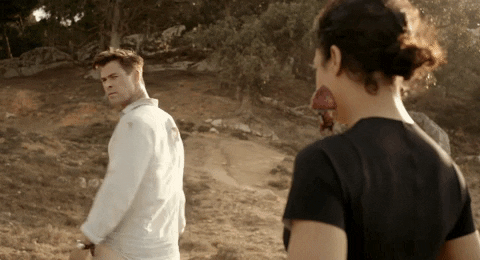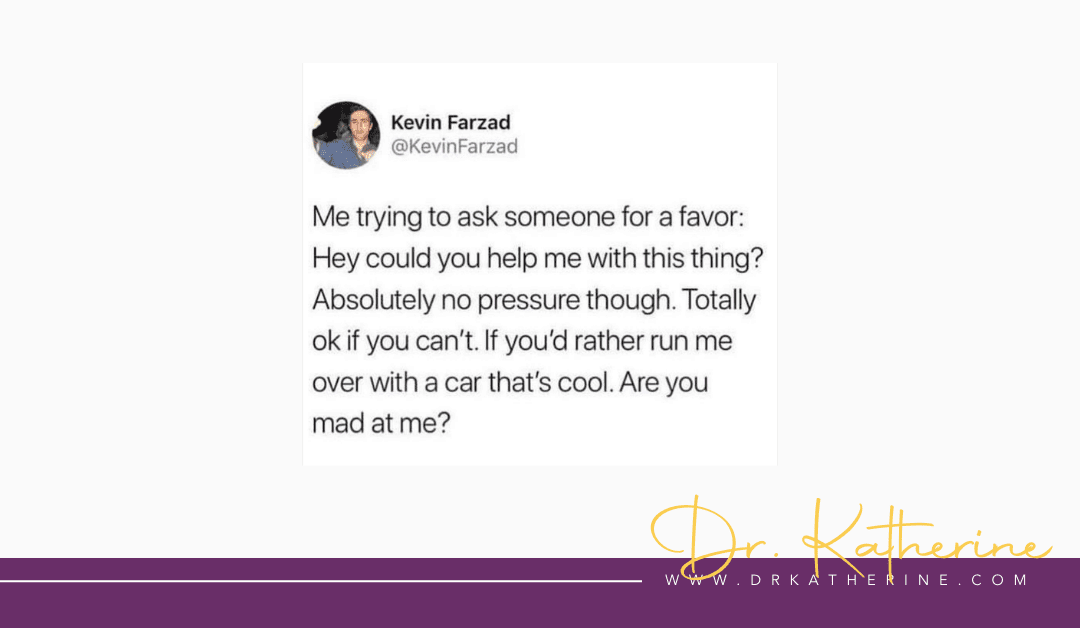Summary: “No, don’t worry – I can do it”. Guilty as charged. While we all like to be self-directed and autonomous, it begs the question: how happy is a lone wolf? In this blog I share a simple way to remember what social support actually is (T.E.A.) and a short but sweet reminder why asking for help and accepting support from your social group has long-term gains for happiness (and sanity, too). And yes, it’s even affective for us high achievers.
We’ve all felt at one point or another like nothing can get us ahead, like we’re stuck in quicksand.
Half of our brain is thinking “Asking for help equates to weakness” while the other half is thinking “get me out I have shit to do!” – right?
That’s probably why I’ve previously underestimated the hidden benefit that social support provides. I just thought I could just do it all myself—fix myself, help myself and learn to love myself while still fitting in time for some aquarobics (true story).
I tried – and it was about as successful as wearing a toupée in a wind tunnel.
I would strongly argue that the tangible benefits of having a healthy social support network are often undervalued (hence why I’m writing this article).
Without social support, life would be like a game of Whac-A-Mole, you hit one and get ahead only to have another one pop up with that spooky grin.

Before I make the argument why social support keeps us out of a looney bin, we need to answer: what exactly ‘is’ social support anyways?
Social support 101
The term social support means having friends, family and others to turn to in good times as well as in times of need or crisis. Their support will guide you to take a step back and look at your situation from a strategic, yet compassionate, perspective which will allow the distance you need to come up with objective solutions to your problems.
When I think about social support, I don’t think about how many friends I have, or how close my family is to me.
For me, social support is about three things:
- Trust
- Effort
- Acceptance
A good way to remember this is that it’s nice to have a cup of TEA with your friends.
Before we dive in to our ‘cup of tea’, have a go at measuring your own levels of social support using this validated questionnaire [1] which was created in 1985, but I think remains the best method of assessment near 40 years later.
Quick tip: I’d encourage you to do this with a friend or a trusted colleague so you can discuss your results in depth. It’s powerful.
Interpersonal Support Evaluation List
Instructions:
This scale is made up of a list of statements, each of which may or may not be true about you.
For each statement, circle ‘definitely true’ if you are super-duper sure it is true about you and ‘probably true’ if you’re like “ya, but not really”.
Same goes to the other answers – circle ‘definitely false’ if you are a “hell no” and a ‘probably false’ if you think it is false but you wouldn’t bet your mortgage on it.

| Definitely false | Probably false | Probably true | Definitely true | |
| 1. If I wanted to go on a trip for a day, I would have a hard time finding someone to go with me. | 4 | 3 | 2 | 1 |
| 2. I feel that there is no-one I can share my most private worries and fears with. | 4 | 3 | 2 | 1 |
| 3. If I were sick, I could easily find someone to help me with my daily chores. | 1 | 2 | 3 | 4 |
| 4. There is someone I can turn to for advice about handling problems with my family. | 1 | 2 | 3 | 4 |
| 5. If I decide one afternoon that I would like to go to a movie that evening, I could easily find someone to go with me. |
1 |
2 |
3 |
4 |
| 6. When I need suggestions on how to deal with a personal problem, I know someone I can turn to. | 1 | 2 | 3 | 4 |
| 7. I don’t often get invited to do things with others. | 4 | 3 | 2 | 1 |
| 8. If I had to go out of town for a few weeks, it would be difficult to find someone who would look after my house or apartment (the plants, pets, garden, etc.). |
4 |
3 |
2 |
1 |
| If I wanted to have lunch with someone, I could easily find someone to join me. | 1 | 2 | 3 | 4 |
| 10. If I was stranded ten miles from home, there is someone I could call who could come and get me. | 1 | 2 | 3 | 4 |
| 11. If a family crisis arose, it would be difficult to find someone who could give me good advice about how to handle it. |
4 |
3 |
2 |
1 |
| 12. If I needed some help in moving to a new house or apartment, I would have a hard time finding someone to help me. |
4 |
3 |
2 |
1 |
Now add up your answers across all columns.
The closer your score is to 48, the higher the level of your social support network.

The reason why I like this scale is that it’s multidimensional—it calculates your support from three different angles (side note: each can be calculated as a score out of 16).
1. If you feel like you have a direct line of support (the sum of questions 2,4,6,11).
2. If you feel that you fit in (the sum of questions 1,5,7,9).
3. If you needed help, do you feel like someone would physically help you (the sum of questions 3,8,10,12).
Keeping in mind that any questionnaire should never, ever be used as to diagnose or taken as hard fact, what’s going through your mind right now? How do you feel about your results?
- Were you surprised?
- Did you expect the answer?
- Are you a bit emotional?
- What questions made you think twice?
- What questions were easy and/or hard to answer?
But don’t think too much – just let your mind wander and likely, during your next shower, something impactful will come to the surface.
How to build our social support network without cringing
Social support is not just asking for help when you don’t understand how to do something, but applies to all aspects of life – from fixing a broken pipe to picking you up when you’ve drunk too much at a party and about to do the worm in front of your boss.
But I think, most importantly, to be unflinching when you need someone to listen to your woes without judgement, offer you a genuine hug and, my personal favourite (as my brain works this way), a nudge of tough love to remind that, yes, I can do it because I’m a bad ass bitch with an invisible cape.

T—Trust
When I say the word ‘trust’, do you automatically think about secrecy? Me too.
Remember back in grade school when we used pinkie swears as a sign of trust? Things like, ‘Do you pinkie swear that you won’t tell him that I like him?’
Trust is complicated but when it works well it is like the strongest glue on earth. It creates bonds between people that are unbreakable.
But what makes us trust another person? Well, this is a tough one, but IMO, until I trusted myself, I never truly trusted anyone else.
What I mean by this is that I had to be honest with myself first. I had to put up my hand and take responsibility for my beliefs, my thoughts and my actions.
Until I did that, I was never my true, authentic self. So why would I trust anyone else if I couldn’t even trust that I could be who I really was without apology?
‘This above all: to thine own self be true,
And it must follow, as the night the day,
Thou canst not then be false to any man.’
—Act 1, Scene 3 – Hamlet
As you probably already know, I love quotes almost as much as I like shirtless photos of my imaginary boyfriend Chris.
But this one, from Hamlet, is without a doubt my favourite.
My dad told me it a long, long time ago and it stuck to me like white on rice.
As I age, I understand this quote more and more. I’m sure it means something different to everyone, but to me it means:
Above all, if you are truly yourself (rather than changing who you are to please others), you’ll always be an honest and kind human being.
Honest behaviour is important not just because it can harm others, but because it ultimately harms you yourself.
Basically, stop bullshitting yourself.
The next step with trust is a bit more complicated, because social trust takes two to tango.

You know those team building exercises where you need to close your eyes and fall back into someone’s arms (while being completely and utterly mortified)?
Well for that to happen, you need one person to be vulnerable, and the other to have the ability, integrity and selfless care to catch you.
And that takes time – you need to be vulnerable when you share something with another human, while the receiver holds it with compassion and care. Then the roles must switch – it’s time for them to be vulnerable while you hold the safety net.
It’s kind of like building a house with bricks – each person needs to lay an equal number of bricks to build a strong structure – but just like a house takes time to build, so too does trust. But if you dissect it down to its simplest components—being your true, authentic self needs to come first—then trust will come later, in time.

E—Effort
For many years, I was reluctant to ask my friends and family for support because I felt like I was a burden. I didn’t want to bother them because my problems were so minimal compared to the rest of this world’s worries: children are starving, people are being tortured and killed due to ideological differences, wars are tearing apart countries. So why would anyone care about my problems?
The one thing I never considered was how rejecting someone’s help could affect them. By pushing away family and friends and saying, “I’m fine, don’t worry about it”, I didn’t realise that they felt rejected by me, and that they felt I didn’t care about them, or want them in my life. The irony is, the more I pushed them away, the more alone I felt. The more alone I felt, the more I would push people away.
So the one thing I can say about effort is that ironically, there is no effort in effort. Because when I help my friends and my family, it never feels like effort. It just feels like the right thing to do.
So I’d ask you to please consider when you need help in future: accept it with humility and grace, because you know if you were on the other side, you’d feel good giving it.

A—Acceptance
Picture this: I’m in gym class. The teacher picks the two captains for our dodge-ball game, Willie on one side, and James on the other. Both were the cool guys of our school. And I mean the cool guys. And yes, they were super-hot, at least for sixth graders (that felt a bit weird to say now that I’m 45… but you get the point).
They each pick from the rest of the class to form their teams. We all stand there in anticipation, praying we won’t be the last one picked.
No matter how old you are, we never lose the desire to be accepted. Whether I’m 11yo in gym class, or 44.8yo checking my social media engagement, it feels good to be accepted, recognised and validated.
This desire starts when we’re young: we’re on the edge of the sandbox, wanting to be invited in. Then we’re a wallflower hoping to be picked to dance. We wait by the phone hoping he’ll call for a second date. We’ve sent in our job application and pray we’ll be picked. The list is endless and the pain that comes with not being accepted is deep. So deep in fact that our brain interprets it like physical pain2.
But…
While it is natural for humans to want to be socially accepted, putting too much significance on it can crush our chutzpah like a chip under a herd of charging camels.

Here are some reasons why:
1. It can lead to conformity: When we prioritise being socially accepted, we may be more likely to conform to the norms and expectations of our social group, even if it goes against our personal values or beliefs. For example, think Hitler and Holocaust, – no and hell no.
2. It can limit personal growth: When we are overly concerned with fitting in, we may shy away from trying new things or pursuing our passions if they are not widely accepted by our social circle. Two words: Screw that.
3. It can lead to anxiety and stress: Constantly worrying about how others perceive us can cause our mental health to plumet. Been there, done that, do not recommend.
4. It can lead to inauthenticity: If we focus too much on being socially accepted, we may start to present a false version of ourselves to fit in, leading to a lack of authenticity in our relationships. Please refer to the past 44 years of life for endless examples.
5. It can create a fear of rejection: If we are overly concerned with being socially accepted, we may develop a fear of rejection, leading us to avoid taking risks and limiting our opportunities for personal growth. Missing out on life? As the Aussie’s say: ya, no.
Summary: yes, it’s uber important to have social connections and feel accepted by others but NOT at the cost of bending on what is really important to use, including our values, what we want out of life and who we are, truly and completely.

The take home message
Social support is about three things: trust, effort and acceptance. Let’s take some time to reflect on these three aspects.
1. Trust. Have you ever been vulnerable and allowed yourself to really be seen by someone else? Did you trust them? Why or why not?
2. Effort. Have you ever pushed away someone’s support? Or has someone else ever pushed away your support? What feelings did you experience?
3. Acceptance. When have you felt accepted, and when have you felt rejected?
Putting these three things together, think about your levels of social support as they are right now. If there are areas to improve, what is a small action you can take today?
I am only one, but I am one. I cannot do everything, but I can do something. And I will not let what I cannot do interfere with what I can do.
— Edward Everett Hale
Why should we care?
A Harvard study started in 1938 that wanted to learn more about adult development. Little did they know it would become the longest study of all time and now includes data from three generations.
One of the questions they asked is: what makes a person happy? They compared different demographics, such as rich people to those less well off.
Different races.
Different genders.
But what they found blew their mind: Nothing impacts happiness more than the richness of your social connections.
Not money.
Not physical health.
Not notoriety.
RELATIONSHIPS.
Dr K xo
References
1. Cohen S., Mermelstein R., Kamarck T., & Hoberman, H.M. (1985). Measuring the functional components of social support. In Sarason, I.G. & Sarason, B.R. (Eds), Social support: theory, research, and applications. The Hague, Netherlands: Martinus Niijhoff.
2. Eisenberger, N. The pain of social disconnection: examining the shared neural underpinnings of physical and social pain. Nat Rev Neurosci 13, 421–434 (2012).

